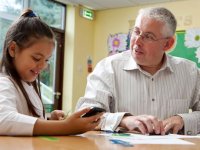Listen to Me with Your Eyes
"The art of conversation is the art of hearing as well as of being heard." - William Hazlitt
Speaking
How many times have you sat through a seminar or webinar discussing the fine art of verbal communication? If you're like me, probably quite a bit.
In my early career as a school principal, I used to spend hours poring over books and resources that I thought would support me to be a better speaker. After all, in this capacity, I was going to be responsible for speaking to large groups of students, teachers and parents -- not to mention my fellow administrative colleagues. I needed to be prepared to impress them with "pearls of wisdom" that would keep my audience riveted to their seats!
At least, that's what I thought.
Listening
As a classroom teacher, I was never at a loss for communication. This was a big plus for me, especially as I spent quite a few years teaching kindergarten. The ability to communicate with four- and five-year-olds is nothing short of miraculous. But better still, understanding what they are trying to communicate is even more so.
When I was in the classroom, taking the time to listen became a real art form. It was a challenge, but I worked on it. For those critical conversations with my students, I'd get down to their level and make sure we were eye to eye before I started talking -- or, more importantly, listening. As the conversation with my students played out, I stayed right there, bent down on my haunches, until I was certain that our conversation was complete. In short, I listened with my eyes.
Understanding
Fast forward ten years, and I'm now in the principal’s seat. Where I’d had this idea in the past that "speaking" was going to win over my community, I found that I was mistaken. Through trial and lots of error, I learned that the true power of developing myself as an educational leader came when I discovered that listening was the key to building passionate, meaningful relationships. It was also the key to better understanding the needs of those I served.
When was the last time you attended a seminar on the importance of listening? I'd venture to say not recently. Yet learning to listen well is a skill that I believe must be sought, cherished and embraced. In the moment that I went back to my classroom roots and became a better listener, my focus as an administrator changed. It became an enriching experience to know that I could be present for those who needed me by listening with my eyes.
As I challenged myself to speak less and listen more, the doors of opportunity flew open to help me support those who were struggling on my campus. From classroom challenges to personal family matters, I was there to listen to my school staff's and students' concerns. I listened hard and often gave no response, except perhaps a nod or a smile. But those small reassurances, given freely, were often all that was needed. Embracing the precious act of listening changed my world -- and I would offer that it can do the same for you.
Are you a good listener? Do you listen with your eyes? Do you look up from that device or from your task to give your full attention to the speaker? If you answered no, you aren't alone.
The art of listening is one that we've ignored for too long, but must seriously get back to mastering.
